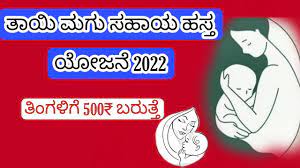Step 2.3 Thayi Magu Sahaya Hastha
Thayi Magu Sahaya Hastha, a nutrition assistance and pre-school education focused entitlement, applies to registered woman construction workers and their first two children for a duration of three years from the date of delivery.
What are the workers entitled to?
A registered woman construction worker is entitled to:
- Per child monthly Rs 500, for 3 years from the date of delivery to support early childhood education and provide nutrition assistance (lifetime total entitlement value of Rs 36,000 per woman).
- Applies to the first 2 children only.
Applications should be submitted within six months of delivery.
Please note: miscarriages are counted as live births.
What are the eligibility criteria?
- The woman worker has to be registered as a construction worker and in possession of a valid labor card.
Wife of a construction worker is not eligible for this benefit. In many cases, both husband and wife work as construction workers, but only the husband has a labour card, believing that one card is sufficient for the entire family.
What documents are required?
- Filled application form XVII-A
- Proof of bank account
- Photo of child
- Employment certificate
- Attested proof of identity/labor card issued by the Board.
- Discharge summary & birth certificate of child
- Ration card (is it reqd as address proof?)
What is the application procedure?
Applicant needs to submit the application via the Seva Sindhu portal within 6 months of delivery.
- The application is first processed and verified by a Senior/Labour Inspector.
- In the final stage, the application is reviewed and approved by a Labor Officer.
Every application has to be accompanied by the birth certificate of the child obtained from the Registrar of Birth and Deaths.
For continuity of benefits beyond the first year, application must be submitted for the second and third years as well. This also requires annual submission of an affidavit to prove that the child, for whom the benefit is claimed, is alive.
Common reasons why construction workers fail to receive the benefits under BoCW schemes
Exclusion owing to policy design
- This scheme applies only to registered woman construction workers, not spouses of construction workers.
- Women must prove that they have worked for 90 days in the year before delivery. Hard physical labour is challenging during pregnancy and the inability to prove makes women ineligible to claim the benefits.
- Proof of child's birth is necessary. Some migrants lack official birth documents when deliveries take place at home making them ineligible.
- 'Living child' affidavit is required for claiming benefits for the second and third years. Obtaining a lawyer's affidavit is challenging and costly.
- Miscarriages are counted as live births, only two live births allowed.
Minimum one-year waiting period for maternity benefit eligibility i.e. should be a registered construction worker for at least a year before claiming benefits.
Exclusion owing to lack of supporting documentation
- Most migrants choose to retain ration card from their villages so are unable to provide local address proof.
- Changing the address in Aadhaar, even within Bangalore, poses a challenge for migrant workers who relocate after marriage.
- A birth certificate for the child is necessary. In instances of home delivery, acquiring a discharge slip poses a challenge, creating obstacles in obtaining the birth certificate.
- An employment certificate is required, but who work irregularly at various sites, obtaining the seal or signature of contractors poses a challenge in acquiring the certificate.
- Applications can be submitted every year, for up to three years
- Workers may submit applications every year, extending up to three years. However, some workers may be unaware of this, leading to their exclusion from the scheme benefits.
Exclusion owing to eligibility conditions
-
Eligibility for this scheme requires women to be registered as construction workers, and wives of construction workers are not eligible.
-
Scheme is exclusively available to vulnerable households, mandating the possession of a ration card.
Exclusion owing to renewal related process
- The program spans three years and is renewable annually, but knowledge gaps can hinder the renewal process after the first year.

